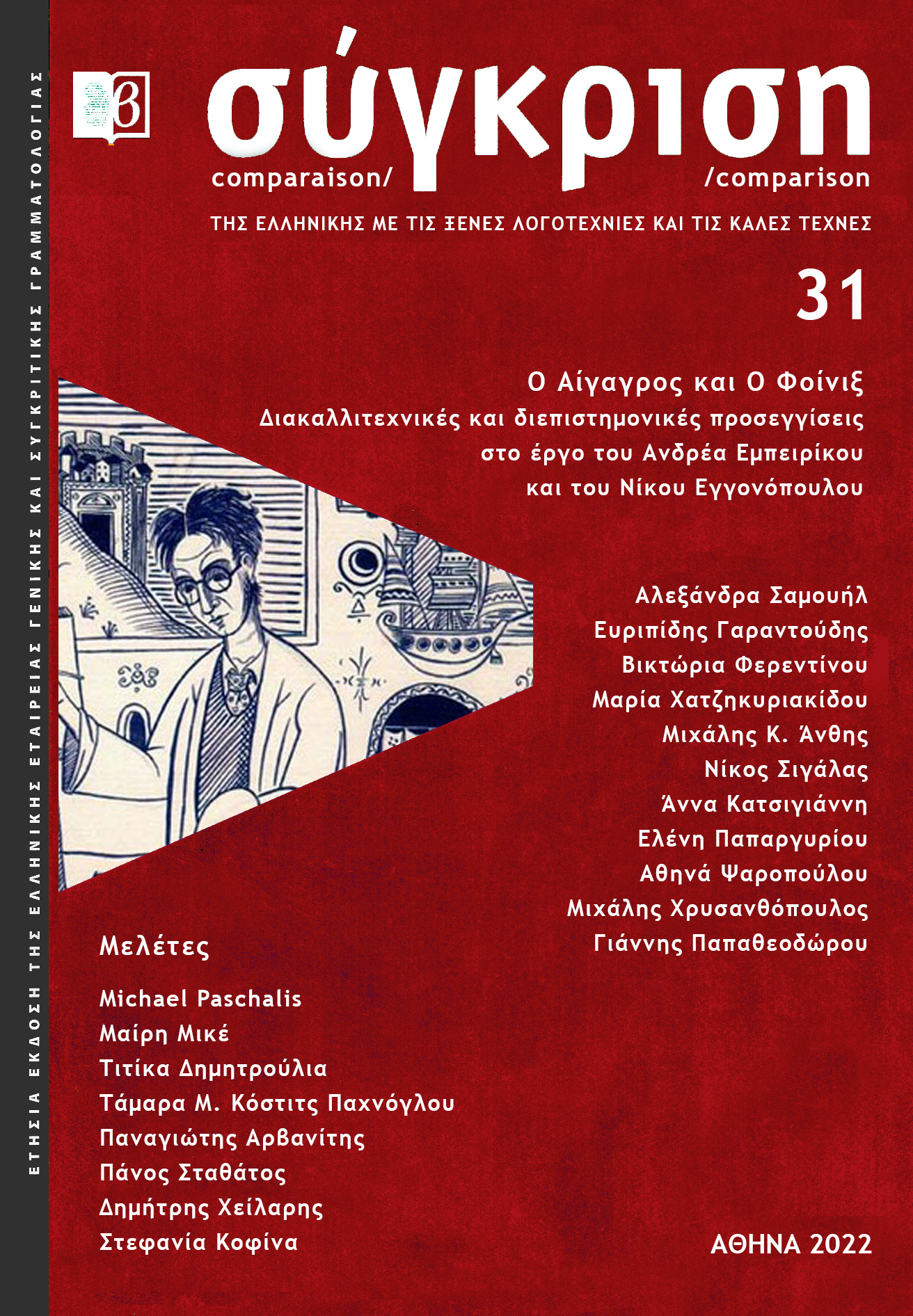ΤΑΜΑΡΑ Μ. ΚΟΣΤΙΤΣ ΠΑΧΝΟΓΛΟΥ, Ο άνθρωπος απέναντι στην εξουσία: Οι περιπτώσεις των ηρώων του Κάφκα και του Φραγκιά

Περίληψη
A man against the authorities: The case of the literary characters of Kafka and Frangias
The topic of power, as well as the ways of its manifestation, has always been relevant and has occupied the attention of many authors. In this paper, we have dealt with a comparative analysis of the representation of the theme of power and its influence on literary characters in the works of two writers - Franz Kafka and Andreas Frangias. The work of Andreas Frangias, precisely because of his approach to the topic of power, which seems prophetic today, is attracting the attention of a growing number of literary scholars in Greece and abroad. It is believed that Franz Kafka had an important influence on his views, and that is the reason why we chose these two writers for the analysis. Although Kafka’s work was created at the beginning of the twentieth century, and Frangias’ during the second half, the topic of power is largely represented in the literary opus of both, but the approaches to this topic are diverse and worth studying. In addition, the question raised by Michel Foucault about whether or not the power can be identified with violence is also the subject of this paper. While analyzing the reactions of the characters to violence, we tried to show the extent to which the two writers equate the notion of power with violence. The analysis showed that the success of the authorities in achieving their intentions largely depends on the reaction of those to whom the violence is directed – they can react in the expected way, but they can also greatly surprise with their attitude and reaction. They can completely surrender to the role of a victim, which is a frequent choice of Kafka’s characters, but they can also, despite the price they will probably have to pay, choose consistency for themselves and freedom, following the example of Andreas Frangias’ characters. The messages about power and the mechanisms of its action that Kafka and Frangias want to send are the same – the authorities use unpredictable mechanisms, they are covert and constantly active, they trie to deceive and rule the mind. Not all people are able to rebel, and many do not think it is necessary. Although they deal with the same topic, Kafka’s work exudes pessimism, surrendering and powerlessness, while Frangias’ optimism, a call to preserve freedom, authenticity and hope. The opinion of most critics that Frangias wrote under Kafka’s great influence, in most cases, proved to be incorrect.
Λεπτομέρειες άρθρου
- Πώς να δημιουργήσετε Αναφορές
-
Κόστιτς Παχνόγλου Τ. Μ. (2022). ΤΑΜΑΡΑ Μ. ΚΟΣΤΙΤΣ ΠΑΧΝΟΓΛΟΥ, Ο άνθρωπος απέναντι στην εξουσία: Οι περιπτώσεις των ηρώων του Κάφκα και του Φραγκιά. Σύγκριση/Comparaison/Comparison, 31, 185–195. https://doi.org/10.12681/comparison.31280
- Τεύχος
- Τόμ. 31 (2022)
- Ενότητα
- Άρθρα

Αυτή η εργασία είναι αδειοδοτημένη υπό το CC Αναφορά Δημιουργού – Μη Εμπορική Χρήση – Παρόμοια Διανομή 4.0.
Οι συγγραφείς των άρθρων που δημοσιεύονται στο περιοδικό Σύγκριση διατηρούν τα δικαιώματα πνευματικής ιδιοκτησίας επί των άρθρων τους, δίνοντας στο περιοδικό το δικαίωμα της πρώτης δημοσίευσης. Άρθρα που δημοσιεύονται στο περιοδικό Σύγκριση διατίθενται με άδεια Creative Commons 4.0 και σύμφωνα με την άδεια μπορούν να χρησιμοποιούνται ελεύθερα, με αναφορά στο/στη συγγραφέα και στην πρώτη δημοσίευση για μη κερδοσκοπικούς σκοπούς και με δικαίωμα τροποποίησης μόνον με παρόμοια διανομή (αν αναμείξετε, τροποποιήσετε, ή δημιουργήσετε πάνω στο υλικό, πρέπει να διανείμετε τις δικές σας συνεισφορές υπό την ίδια άδεια όπως και το πρωτότυπο).


